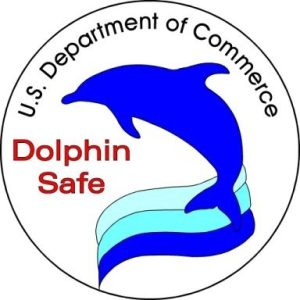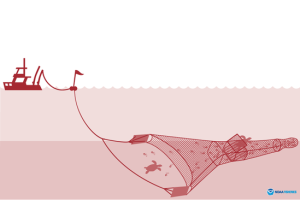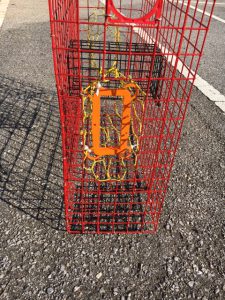
If you’ve ever spent any time fishing, you know it’s rare to catch exactly what you want on the first bite. Even more so, when large nets are pulled behind boats at sea, it’s impossible to catch a single target species. These extraneous fish and invertebrates are referred to as “bycatch,” and in the world of commercial fishing, bycatch can be a serious problem. We’ve all seen the heartbreaking photos of dolphins caught in nets, and many will recall the advent of “dolphin-safe” tuna in the 1990’s, the result of the commercial fishing industry changing practices to reduce harm to protected species.

In 1989, after too many reports of endangered sea turtles being entangled in shrimping trawls, turtle excluder devices—aka TEDs—were required on all commercial trawling operations. TEDs are large metal grids that let shrimp into the net but allow inadvertently trapped sea turtles to escape. Research on the use of TEDs shows a 97% effectiveness rate in preventing sea turtle entanglement since they came into practice.

Starting March 1 of this year, a similar device will be required on recreational crab traps to protect a different species of turtle. Diamondback terrapins are the only salt marsh-dwelling turtles in our area, nesting on small beaches and feeding in the shallow waters of adjacent marshes. However, dwindling populations and reports of diamondback terrapins being captured and drowning in the traps have resulted in a need for greater protection. As of early 2022, a Florida Fish and Wildlife Conservation Commission ruling mandated that there can be no capture or incidental “takes” of terrapins. To address this, crab traps can be retrofitted with bycatch reduction devices (BRD’s). These are 6”x2” rectangular-shaped frames that can be installed over the openings of crab traps to prevent terrapins from entering the traps. Until crab traps outfitted with 6”x2” funnels are readily available in the market, crabbers can pick up free BRD’s from their local Extension Office. Here in Escambia County, reach out to our Sea Grant Agent, Rick O’Connor (roc1@ufl.edu or 850-475-5230) to get the materials. On Thursday, Rick and I will host a Science Hour program via Facebook Live to demonstrate how the BRDs work, and can answer any questions you may have about the new practice.
 2
2
